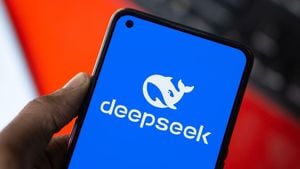Recent developments have ignited immense speculation and dynamics within the global AI market following the introduction of DeepSeek's R1 model. The release of this Chinese startup's AI language model has sent shockwaves through established giants like NVIDIA and OpenAI, challenging their perceived dominance. Known for their deep learning capabilities, DeepSeek's product demands significantly lower hardware requirements, stirring investor action and resulting in notable losses for companies like NVIDIA.
On February 24, 2025, reports confirmed DeepSeek's R1 model was not only generating buzz but had also emerged as the most downloaded free app in both the United Kingdom and the United States. This monumental shift occurred within weeks of its launch, effectively reshaping competitive landscapes and altering perceptions of market potentials. Essentially, DeepSeek’s R1 ability to yield competitive outputs with advances made on development costs estimated at just $5.6 million raises serious questions about prevailing business models followed by leading AI companies.
The ramifications of DeepSeek’s breakthrough have not gone unnoticed, particularly impacting NVIDIA, the current market leader specializing in high-performance AI chips. Following the R1 model’s release, NVIDIA experienced extraordinary market upheaval, witnessing losses of nearly $600 billion, marking the largest single-day loss recorded by any company. Such staggering impacts highlight the vulnerabilities technology leaders face when innovative rivals introduce cost-effective and efficient alternatives to traditional AI solutions.
Industry analysts, such as Don Townswick, director of equity strategies at Conning Asset Management, caution against underestimations of DeepSeek's potential for continued turbulence. He acknowledged, “The effects of DeepSeek have yet to be fully reflected within the US stock prices.” Conversations surrounding cybersecurity and data privacy have also emerged, hinting at additional risks associated with DeepSeek's handling of user data. Questions circulate as to whether user information might be prone to unauthorized access, referencing recent inquiries led by Microsoft aimed at examining potential breaches within OpenAI.
Despite these concerns, expert sentiments remain mixed as some tout the benefits offered by the R1 model. Marc Andreessen, risk capital investor, characterized DeepSeek-R1 as “an impressive breakthrough and significant gift to the world.” This statement emphasizes the potential for lower-cost, open-source models to reshape investments traditionally directed at Western tech giants.
Nevertheless, NVIDIA is not positioning itself as the market's ultimate casualty. Analysts remain optimistic about the giant's prospects. According to Goldman Sachs strategist Peter Oppenheimer, he does not foresee DeepSeek’s stirring market tremors leading to a broader bear market. Instead, experts predict NVIDIA will emerge from the incident as one of the prime beneficiaries of increasing demand, particularly as AI applications continue to expand and complexify.
A notable portion of investors viewed NVIDIA's momentary declines as golden buying opportunities. Prominent investors, like Chris Versace, have leveraged the decline to bolster their shares, arguing the market's response was exaggerated, especially considering hints of DeepSeek's intentions were evident long before the official launch.
Prominent analysts from institutions like Wedbush have deemed DeepSeek's introduction as merely short-term shockwaves. They maintain NVIDIA's positioning as indispensable for autonomous systems, robotics, and other fields reliant on cutting-edge chips. This perspective is reinforced by the projected technological breakthroughs expected to sustain NVIDIA's utility and relevance.
Future projections suggest NVIDIA is on the path to potentially becoming the world’s first AI company with valuations soaring to $4 trillion. Market capitalizations nearing this astronomical figure have become credible following NVIDIA’s rapid ascension since the arrival of technologies like ChatGPT. The looming question is whether NVIDIA can rebound quickly enough to overcome any remaining uncertainty created by this upheaval. Observers noticed its stock, at around $3.4 trillion as of February 21st, 2025, would need to surge by about 38% to reach the $4 trillion milestone.
Interestingly, the upcoming quarterly results announcement, slated for February 26, could provide pivotal insights about deepening demands and potential shifts fueled by the emergence of DeepSeek. A solid performance could necessitate only minimal stock increases to secure impressive future valuations.
The cold reality is the AI market appears anything but static. The introduction of DeepSeek brings to light the fact AI continues to evolve, not just technologically, but also competitively. Stakeholders and spectators alike are cautiously watching how these dynamics will unfurl. Although many perceive the rise of DeepSeek as indicative of changing tides, NVIDIA alongside other major tech companies remains pivotal within this shifting matrix.
With this vibrant backdrop, it stands clear; who prevails will depend on adaptation to the changing demands of the market. While initial anticipations of DeepSeek as solely adversarial might not hold, the prospect of AI models requiring lesser performance could open new lanes for companies like AMD and Intel to carve their share under these new demands. The future of AI is undoubtedly dynamic, ever-captivated by each new development as it sways the scales of victory.



